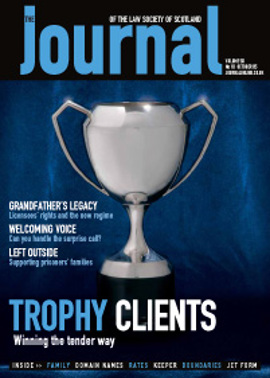Supporting credentials

Solicitors need professional witnesses from time to time, many using them extensively to bring expertise that the courts lack. But there is the problem: how, lacking that expertise, can the court decide who is an expert and who is right for a case?
Expert evidence is rarely out of the news. In the light of recent high profile cases, there is a strong case for careful risk management when engaging professional witnesses. The rapidly expanding Register of Forensic Practitioners will help in your choice.
Cases such as the Birmingham Six and the Guildford Four caused the forensic science community to reflect. The decision was to create a single register of currently competent forensic practitioners, committed to high standards of conduct against which they could be judged if something went seriously wrong.
Public confidence
CRFP – the Council for the Registration of Forensic Practitioners – was set up with government support to give effect to that decision. Our central objective is to promote public confidence in forensic practice in the UK. We will achieve this by:
- publishing a register of competent forensic practitioners;
- ensuring through periodic revalidation that forensic practitioners keep up to date and maintain competence;
- dealing with registered practitioners who fail to meet the necessary standards.
Our governing council consists predominantly of users of forensic practice. It includes a senior procurator fiscal appointed by the Crown Agent, a judge, a chief constable and barristers’ and solicitors’ representatives.
The detail is on our website www.crfp.org.uk. Our Code “Good Practice for Forensic Practitioners” is accepted throughout the forensic world; and in our disciplinary procedures – designed to deal with allegations of poor practice – we aim to reflect modern thinking in professional regulation.
Assessment first
Registration is voluntary and lawyers remain free to engage the experts they choose. In any case, the register is at present open only to the mainstream forensic specialties listed below. But if we get it right the register will become a definitive indicator of current competence in forensic practice.
We assess the competence of each individual who applies to be registered – there are no “grandparent” rights or automatic guarantees of registration. We do not rely on reputation, qualifications or the length of time someone has been practising. An assessor from the same specialty scrutinises recent casework in detail. Assessment is a thorough process and no one – however eminent – gets through on the nod.
We achieved our first target of 1,000 names some time ago and the register now has over 2,200 entries. At present the register is open to practitioners in:
- forensic science (drugs, firearms, human contact traces, particulates, marks, questioned documents, incident reconstruction, toxicology)
- scene examination (mainly police SOCOs)
- fingerprint examination
- fingerprint development (enhancement of marks for analysis)
- collision investigation
- vehicle examination
- paediatrics
- forensic medical examination (the traditional police surgeon)
- fire scene examination
- veterinary science
- forensic odontology (identifications and bitemarks)
- forensic anthropology (including osteology and facial reconstruction)
- forensic archaeology.
All these are described more fully on the CRFP website. Checking someone’s registration takes a few seconds and a few clicks of a mouse.
The register will open to forensic computer specialists in November, with imaging and telecoms specialists following later. Ultimately the register will grow to 6-7,000 names. We have further work to do in specialties such as forensic nursing, accounting and other key professional groups.
Positive response
So there is some way to go. It is an ambitious project but is commended by the Lord Chancellor, Senior Law Lord, DPP and successive Lords Chief Justice and Masters of the Rolls.
Scottish judges have responded well to presentations about CRFP at their regular refresher courses, readily seeing the advantages of a definitive register for the way cases are managed. CRFP registration will also have an important part to play in a revamped system of authorisation – the uniquely Scottish mechanism which enables forensic evidence to be accepted without a personal appearance in court.
The time has come when it would be worth your asking, when engaging or challenging a forensic practitioner in one of the above specialties, whether they are registered with CRFP and, if not, why not.
What you see is what you get? Not always. But while no register can ever guarantee perfect practice at all times, the Register of Forensic Practitioners offers a step further in the direction of genuinely independent accreditation.
For more information look at the website or email to info@crfp.org.
Alan Kershaw, Chief Executive, Council for the Registration of Forensic Practitioners
In this issue
- Back on the home front
- Exchanging the "missive"
- Perfect pitch
- Tales from the court
- The going rate
- Licence please
- "Your call is important to us..."
- Wake up to .eu
- Know your boundaries
- Outside in
- Checks and balances
- Policy and practice
- Supporting credentials
- Infrastructure: who pays?
- Protective awards unprotected
- Website reviews
- Book reviews
- New terms for old
- Keeper's corner






